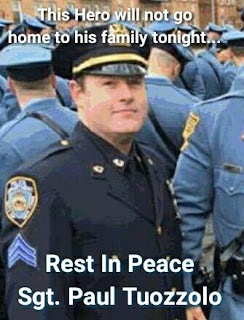In our knee-jerk reaction to emotional incidents throughout
our lives, perspective can easily be swept to one side. This seems to be
especially true with police officers. A friend recently posted this meme, that
labels Sargent Paul Tuozzolo a “hero”. Sgt
Tuozzolo was shot and killed in the line of duty by a bad guy in Bronx, New
York on Friday. Certainly I feel terrible for his family, but this "hero"
label is used pretty loosely, much the same way we call too many musicians and
actors “superstars”. Unlike a lot of
people in the military, Sgt Tuozzolo wasn't drafted. He applied for the job and
was well aware that it involved risks. High risks. It's the 15th most dangerous
job in the USA, but Is anyone who dies on a job that they knew was dangerous a
hero? Did he jump in front of a friend and take a bullet for them? Did he
intentionally sacrifice his own life to save others? Did he do something above and beyond the job
he was hired to do? If so, yes, he is a hero. Otherwise, he is a sad casualty
of a highly risky profession, a profession which he chose to be his life’s
work.
When a police officer gets killed in the line of duty, whole
communities stop and pay their respects, as they should, often referring to the
death as a “tragedy”. But aren’t all unintentional deaths a tragedy? Cops are
#15 on the list of “Most Dangerous Jobs in the USA”. What about trash
collectors in the #5 spot? When a trash man gets run over in the street, does
the whole community mourn? Do they support a funeral procession of 100 garbage
trucks, lights on and all intersections opened by police so there is a
continuous flow of traffic to the cemetery? After all, the trash guy was
serving the community in his job too.
Don’t get me wrong. In no way am I “anti-cop”, hey, I’m glad
they are out there and my hat is off to them. No way would I want to do what
they do, but then I don’t want to be a trash collector either. Both chose their
respective professions. The electrical power-line workers who restored our
service after Hurricane Matthew a few weeks ago are #9 on the list. They pulled
long hours to get us going again. Are they heroes or were they just doing a job
that they know is dangerous and may occasionally demand very long hours to get
power restored after a natural disaster?
Ours is a coastal town with many locals who work in fishing related
industries. That’s listed as the #2 most dangerous job. When does the
accidental death of a local fisherman get anything more than the standard
obituary on page 5?
If cops are heroes for doing their jobs, so is the trash guy
and so is the fisherman. Right?
All of these deaths are tragedies, all are heroes, no one
any more than another, but that’s not how we treat them in our communities.
Why is that?
Most Dangerous Jobs of 2014
2014 RANK OCCUPATION FATAL INJURIES PER 100,000 PEOPLE TOTAL DEATHS
1 Logging workers 110.9 78
2 Fishers and related fishing workers 80.8 22
3 Aircraft pilots and flight engineers 64 82
4 Roofers 47.4 83
5 Refuse and recyclable material collectors 35.8 27
6 Farmers, ranchers, and other agricultural managers 26.7 270
7 Structural iron and steel workers 25.2 15
8 Driver/sales workers and truck drivers 24.7 880
9 Electrical power-line installers and repairers 19.2 25
10 Taxi drivers and chauffeurs 18 68
11 First-line supervisors of construction trades and extraction workers 17.9 130
12 Construction laborers 16.9 208
13 First-line supervisors of landscaping, lawn service, and grounds keeping workers 16.4 33
14 Maintenance and repairs workers, general 14.4 68
15 Police and sheriff's patrol officers 13.5 97
16 Grounds maintenance workers 13.1 158
17 First-line supervisors of mechanics, installers, and repairers 12.3 38
18 Painters, construction and maintenance 10.8 46
19 Electricians 10.4 79
20 Telecommunications line installers and repairers 10 19
2014 RANK OCCUPATION FATAL INJURIES PER 100,000 PEOPLE TOTAL DEATHS
1 Logging workers 110.9 78
2 Fishers and related fishing workers 80.8 22
3 Aircraft pilots and flight engineers 64 82
4 Roofers 47.4 83
5 Refuse and recyclable material collectors 35.8 27
6 Farmers, ranchers, and other agricultural managers 26.7 270
7 Structural iron and steel workers 25.2 15
8 Driver/sales workers and truck drivers 24.7 880
9 Electrical power-line installers and repairers 19.2 25
10 Taxi drivers and chauffeurs 18 68
11 First-line supervisors of construction trades and extraction workers 17.9 130
12 Construction laborers 16.9 208
13 First-line supervisors of landscaping, lawn service, and grounds keeping workers 16.4 33
14 Maintenance and repairs workers, general 14.4 68
15 Police and sheriff's patrol officers 13.5 97
16 Grounds maintenance workers 13.1 158
17 First-line supervisors of mechanics, installers, and repairers 12.3 38
18 Painters, construction and maintenance 10.8 46
19 Electricians 10.4 79
20 Telecommunications line installers and repairers 10 19

No comments:
Post a Comment